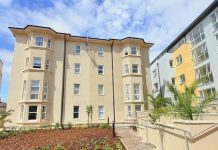Bristol has an “unbelievable opportunity” to attract inward investment and capitalise on its position as the fastest growing economy outside London.
That was the message from Bristol Mayor George Ferguson addressing potential investors and developers at a special event in the city.
But Mr Ferguson, an architect by profession, warned against the temptation to “make a quick buck” when it came to new developments, urging instead for the property industry to be “creative and inspirational”.
“The London market is overheating and Bristol, as the fastest growing city outside the capital, has an unbelievable opportunity – but it will be a challenge,” he said.
Mr Ferguson was the guest speaker at commercial property consultants Hartnell Taylor Cook’s annual Bristol commercial property review which this year took place at One Glass Wharf, home to law firm Burges Salmon.
“In the past we should have been a lot more creative and inspirational about what we have built and I’m determined to not let that happen again,” said the Mayor.
“We need to develop Bristol as a place where everybody else wants to be, and that means we need to be building much more than just urban office parks.”
To illustrate his point the Mayor used the proposed new arena for Bristol, saying the last thing he wanted to see was “a big box in a car park”.
“For the arena I want to see something that is really special – that is the key to success,” he said. “Let’s make sure when we deliver an arena it is a place buzzing with activity.”
He added: “What I am saying is let’s be much more visionary than we have been in the past.”
Also speaking at Hartnell Taylor Cook’s Bristol commercial property review was Kirsten Durie, development manager for Network Rail, who provided an update on the proposed redevelopment works to Temple Meads Railway Station, due to start next year.
She said. “Independent research has shown that, in the past, where we have invested in the redevelopment of stations there has subsequently been significant further inward investment in those areas.”
The research found that, for instance, the upgrading of Manchester Piccadilly, at a cost of around £70 million, had led to the creation of about 650,000 sq ft of new development around the station.
In addition, £25 million redevelopment work at Sheffield Railway Station had led to rental increases of up to 60 per cent at commercial properties within a 400 metre radius.
“This is the ripple effect that happens when we make an investment in a station,” said Kirsten Durie, adding: “We believe we can make a really significant contribution to Bristol.”
Ian Lambert, partner in charge of the investment team at Hartnell Taylor Cook, told the audience of potential investors: “The enthusiasm and drive of people like George Ferguson, combined with vital infrastructure projects, such as the redevelopment of Temple Meads, makes Bristol capable of competing with any city in Europe and an exciting proposition for inward investment.”




















